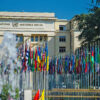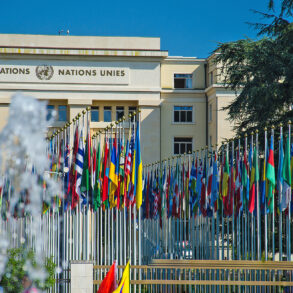US Muslims: Umar Lee in conversation about belligerence and level of organisation among American Muslims.
Umar Lee is an author and writer on American Muslim affairs and is an activist in Saint Louis. His work has been published in several prominent media outlets. He is a regular interviewee with international media.

Photo: Drazen Zigic, Shutterstock
US Muslims: Debates follow general trends
Islamic Newspaper: Dear Umar Lee, if you follow the Muslim community in the US, you notice a pronounced tendency towards passionate debates. Is this a misperception?
Umar Lee: I wish it were. But the answer is no. I have engaged in such feuds myself for years as a blogger and writer – some productive, some unproductive. We are part of the general culture. Our politics of the last 25 years has been characterised by ever-increasing partisanship. And many are characterised by hip-hop culture, which includes fought-out disputes.
It is simply that Muslims exist as part of society in America. We mimic the trends that are prevalent in it. If you look at other communities – Christian or Jewish – you also see these kinds of feuds and power struggles.
Islamic Newspaper: Are these public disputes a reaction to current issues or do they stem from an underlying mood?
Umar Lee: That has changed over time. When the internet came up and Muslim discourse started there, Salafists and “Islamists” dominated. After 9/11, debates started between Sufis and Wahhabis. However, these are no longer the main issues.
The big debates are currently about American domestic politics, gender and sexuality. Which side are you on? Progressive or not progressive? This is dominated by those who want to argue with progressive left politics in America and those who identify with conservative politics. Religious extremists have been marginalised recently.
Islamic Newspaper: Currently, much of the focus among US Muslims is on masculinity and male role models. Is this authentic or artificially created?
Umar Lee: The biggest discussions now are about masculinity, sexuality in general and gender identity. These topics are being discussed the most heatedly and with the most conviction right now. However, they reflect the wider society.
Within the wider community, they just have a different way of expressing themselves. You know, the culture wars are dominating politics right now. And Muslims are part of it.

Photo: Adobe Stock
Black Muslims have different discourses
Islamic Newspaper: The Black Muslim community is one of the pillars of American Islam. Many of them live in inner-city problem neighbourhoods with tangible problems like violence, drugs, poverty and so on. Could it be that there is a disconnect here between these debate topics and pressing issues?
Umar Lee: Yes, there is a disconnect. It’s really a complex issue. I have to break it down into a couple of different parts. First, African American Muslims tend to be more religious. They tend to be statistically the lowest income – there are, of course, affluent among them.
There is a tendency here to have poverty issues, but there is no engagement with the political right as there is with South Asian and Arab. There is a big disconnect with black Muslims. They are pretty much overlooked in the discourse and reporting. This is a division in the community.
Islamic Newspaper: Is this only true for big cities or the entire United States?
Umar Lee: As a rule, the majority-black mosques are in predominantly black neighbourhoods. Meanwhile, the South Asian or Arab mosques are in the suburbs. These are areas with a low black percentage.
In cities like New York, you see a bigger mix because everyone lives in close proximity to each other. But because of America’s geography and the way our metropolitan areas are laid out, there is often a lot of sprawls. Some of our suburban mosques are 99 per cent Indian or Pakistani.
Islamic Newspaper: How do people deal with this?
Umar Lee: Some see it as a problem. For others, it is not. So far, I haven’t seen it raised as a major issue.

Photo: You’re a Creator
Great influence of VIP preachers and charismatics
Islamic Newspaper: Looking at it from Europe, does it look like the Muslim landscape in the US is heavily influenced by individual personalities such as scholars, imams, preachers or YouTube personalities?
Umar Lee: I think similar conditions can be found in Britain. I once referred to the phenomenon as “celebrity imams.” They drive a lot of the public discourse. Now we have not only them, but also well-known YouTube channels and TikTok characters.
People rely heavily on individuals. And so then there are feuds between followers of different celebrities. It’s a bit like the mentality of sports fans.
Islamic Newspaper: Do American Muslims have something like political leaders?
Umar Lee: No, there is no such leadership. You must understand that the politics of American Muslims have changed and are in the process of changing again. Politically, before 9/11, they were heavily influenced by the Muslim Brotherhood, which dominated many positions and discourse.
Afterwards, the progressives took the lead due to several factors. They had a lot of help from outside, from non-Muslim progressive donors and NGOs. Now we are seeing a shift to the right, where many people are leaving the left and going to the right – mainly because of issues of gender and sexuality. And some are doing it because they like Donald Trump or right-wing politics.
There is no body or organisation like a mufti that could unite everyone and work for the health of the whole community to get everyone on the same page: This is not the case in America.
Evangelical networks and methods as a model
Islamic Newspaper: Sometimes it seems that some of the leading figures of American Islam have copied their habitus and appearance from evangelical Christians…
Umar Lee: Absolutely. I know for a fact that some of our popular imams have studied the evangelicals. They have studied their business workshops because they have an industry and books on how to run organisations and how to get more people into their churches. I know for a fact that some Muslims have taken popular evangelical personalities and organisations as models for what they would like to emulate.
Islamic Newspaper: It seems they are copying their affirmative attitudes towards capitalism like the “Gospel of Prosperity”…
Umar Lee: You must remember that there is no government support for religious institutions or associations in the US. Before 9/11, many mosques were funded by the Gulf, especially Saudi Arabia. This money has not flowed in the last 22 years. They withdrew the funding at the request of the US government.
All Muslim organisations have to support themselves. They must raise money and are totally dependent on the wealth of the community. If you don’t support and grow your community, they cannot survive. They have learnt from the churches how to support their communities and survive economically.
Islamic Newspaper: Isn’t there a danger of adopting not only methods but also content?
Umar Lee: That is one of the debates. There are personalities like Omar Suleiman who focus intensely on social justice. Now there is a newer generation of critics who are not interested in that.
They are interested in economics, making money and the more fundamentalist tendencies of Islam. They don’t really want to be involved in a larger society; they want to isolate themselves as a Muslim community.

Photo: Zaytuna College
Are Muslims a factor?
Islamic Newspaper: There are cities in the US like Dearborn with a significant Muslim population. Are they a factor in a positive sense?
Umar Lee: Yes. I was just in the Detroit area and visited Dearborn as well as Hamtramck. Hamtramck (Michigan) is a majority Muslim city. Muslims are a factor in these cities. In New York, progressive Muslim members were recently elected to the city council.
Some of the Muslim politics look different; depending on where you are in the US. Someone like Ilhan Omar (Minnesota) was elected to the House of Representatives by white liberals. She was not a product of Muslim grassroots efforts.
Islamic Newspaper: With all the debates and challenges you mentioned, how important is the issue of race in the US?
Umar Lee: I would say that everything in the US is influenced by the issue of race. There is always a racial component. Daniel Haqiqatjou’s supporters tend to be hostile to black people. Many of them tend to have a close relationship with racists or are outspoken racists themselves.
And those who advocate for social justice like Omar Suleiman tend to have racial justice and harmony as part of their message. Race is a central theme in American politics, culture and discourse.
Islamic Newspaper: In conclusion, what places should you have seen as a Muslim in the US?
Umar Lee: If you come to America, we have wonderful communities in New York, Detroit, Chicago as well as across the country. There is also a fantastic halal food scene. And if you visit me in St. Louis, you get a tour of the city and delicious halal food.
Islamic Newspaper: Dear Umar Lee, thank you very much for the interview.











